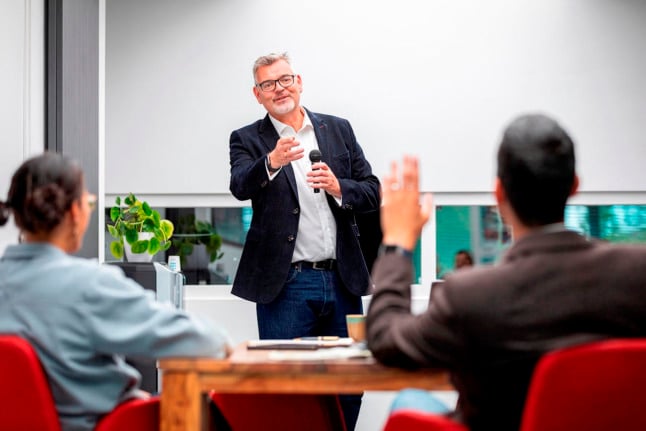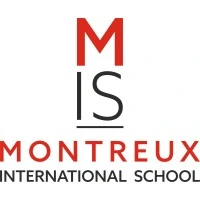Here's how international schools can help your child find their life purpose
The pace of change today means schools are being challenged like never before to ensure their teaching remains relevant. How can you as a parent be sure your child is getting the education they need for tomorrow’s world?

One solution could be to look at schools teaching the International Baccalaureate Career-related Programme (IBCP). Unlike most school curricula, the IBCP – which is the fastest-growing IB programme – was developed in the 21st century.
It aims to provide students aged 16 to 19 with a toolbox for their future lives and careers, promoting a wide range of skills and self-confidence.
The Local has partnered with Montreux International School, a Swiss co-educational international school for 16 to 19-year-olds that focuses on the IBCP, to highlight five ways in which your child’s school can prepare them for a complex future.
1. By letting them pursue their passions
“Students need choice and they need to own their own learning,” says Jon Halligan, former head of business development for the International Baccalaureate. The idea that children can learn as passive recipients of information, whether by listening in silence to a teacher or simply reading a textbook, is on the way out.
The IB has always looked to encourage inquiry-based learning in the belief that learners construct their own knowledge. Now, the IBCP looks to do that in a way that is fit for the digital age.
Halligan says teenagers’ brains mature much more quickly now than in the past, making them more demanding in wanting to know why they should engage with something. “We’re trying to allow students to pursue their passions, making sure that their learning is relevant and authentic,” he says. “I’m consistently asked ‘Why am I learning this?’ They’re most engaged when they see purpose and relevance.”
2. By emphasising principles
From fighting climate change to personal wellbeing, young people expect ethical concerns to be central to their future careers. Being caring and principled are two of the ten key attributes all IB students are expected to develop. IBCP students have a clear framework for this through courses on service learning and personal and professional skills.
The latter encourages them to explore deep issues about personal identity, says Halligan, who is now Managing Director at Montreux International School. “Once you start to understand yourself, you can also appreciate how other people can be right even if they don’t have the same values or identity as you,” he says.
Students are also asked to focus on what it means to be part of a team and what constitutes leadership, he adds. Montreux International School also offers its own Global Perspectives series of courses to encourage students to “step back and explore their place in the world”.
3. By giving them real world relevance
Teenagers today want to know where they’re going and why. The well-known International Baccalaureate Diploma Programme (IBDP), developed in the 1960s, focuses on preparing for university studies. But the IBCP is broader, providing accelerated routes to leading global universities and clear career opportunities.
“Life has moved on a lot,” says Halligan. “The IBCP opens up industry pathways, as well as a path to university, and allows students to see the purpose of what they’re learning.”
Students at Montreux International School will take at least two courses from the traditional DP to give them a solid academic grounding, the IBCP core (focusing on interpersonal skills and problem-solving), plus a professional learning qualification with an external industry partner.
The choices for the final career-related part are Business, Luxury Hospitality and Brand or Business and Digital Marketing. There are huge opportunities in both sectors, says Halligan. “Hospitality is undergoing a huge transformation and it’s an amazing time to be the generation who shape it,” he says. “Digital marketing has boomed because of the pandemic and is going to become even more important whatever industry you’re in.”
Nor does choosing one route mean you can’t change course. “Business is a huge field and the skills you learn on our programmes are transferable,” he adds.
 Jon Halligan. Photo: VIE Education
Jon Halligan. Photo: VIE Education
4. By unleashing their entrepreneurial spirit
“I think all students are entrepreneurial,” says Halligan. “As humans, we’re naturally creative and everyone has ideas.” But not all schools or curricula stimulate or foster that creative impulse. “We like the IBCP because it teaches students how to generate, analyse and interrogate ideas,” he continues.
A key differentiator compared with most educational programmes is the focus on helping students to analyse risks and see how to apply their ideas in the real world.
“All the tools you might see taught in an MBA or a higher level degree are taught in the IBCP,” he says. “It’s quite unique in that regard.” So teenagers learn how to do a SWOT analysis and use the starbursting technique for brainstorming to name just two.
The emphasis is on developing the competency to get things done, rather than just passing an exam. “Learning from failure and understanding your mistakes is the most powerful learning you can do,” adds Halligan. “History is littered with examples of this, from Churchill to Steve Jobs.”
5. By helping them ask big questions about tech
Teenagers studying an IBCP need to develop a wide range of technical skills. But to think that’s the whole point so far as education and technology is concerned is to miss the point, says Halligan.
“What’s more important than ever is allowing students to explore their relationship with technology, and the positive and negative impacts that can or could happen,” he says. Teenagers should understand not only their identity but also their “virtual identity”.
At Montreux International School, students will study the THRIVE curriculum, based around the work of US-based organisations such as the Center for Humane Technology. They’ll be encouraged to reflect on both practical and ethical questions.
The former include understanding what accepting cookies means. The latter extends to one fundamental question facing the world, says Halligan: “Just because we have the technology to do something, should we?”
Learn more about the first Swiss IBCP-only school. Is your child ready for tomorrow’s world? Admissions to Montreux International School are open for September 2021 and you can take a 360 degree VR campus tour online
This content was paid for by an advertiser and produced by The Local's Creative Studio.

Join the conversation in our comments section below. Share your own views and experience and if you have a question or suggestion for our journalists then email us at [email protected].
Please keep comments civil, constructive and on topic – and make sure to read our terms of use before getting involved.
Please log in here to leave a comment.